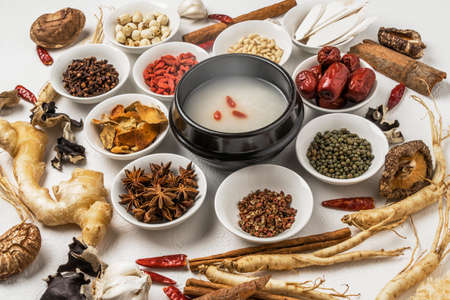Introduction to Ayurveda and Herbal Remedies
Ayurveda, an ancient system of holistic healing that originated in India over 3,000 years ago, has been steadily gaining recognition across the UK. Rooted in the Sanskrit words “ayur” (life) and “veda” (knowledge), Ayurveda centres around achieving balance within the body, mind, and spirit. The practice is grounded in the belief that health and wellness depend on a delicate harmony between our internal energies—known as doshas: Vata, Pitta, and Kapha. One of the foundational pillars of Ayurveda is its reliance on herbal remedies. These plant-based treatments are carefully selected and blended to support individual constitutions, aiming to restore equilibrium and address specific imbalances. In recent years, as people in the UK seek natural alternatives to conventional medicine, Ayurvedic herbal remedies have emerged as a gentle yet effective option for supporting everyday wellbeing. This article explores how these time-honoured botanicals fit into modern British lifestyles, considering both traditional wisdom and local context.
Popular Ayurvedic Herbs and Their Benefits
Ayurveda has long celebrated the healing powers of various herbs, many of which are now gaining popularity across the UK as people seek more natural ways to support their wellbeing. Some of the most commonly used Ayurvedic herbs—ashwagandha, turmeric, and holy basil (also known as tulsi)—have found their way into British wellness routines. Let’s explore their traditional uses and the claimed benefits that make them stand out in both Eastern and Western practices.
Ashwagandha: The Adaptogen for Modern Life
Ashwagandha is often referred to as an adaptogen, a herb believed to help the body manage stress. Traditionally, it has been used in Ayurveda to support energy levels, improve sleep quality, and promote emotional balance. In the UK, where the pace of life can be relentless, ashwagandha is increasingly sought after for its potential to ease anxiety and fatigue—a natural solution for those aiming to maintain a balanced lifestyle.
Turmeric: The Golden Root
Turmeric has earned its place both in ancient Ayurvedic texts and modern British kitchens. Its active compound, curcumin, is renowned for anti-inflammatory properties. Traditionally used to support joint health, digestion, and overall vitality, turmeric supplements and teas have become popular in the UK among those looking to ease aches or simply boost their daily routine with a warming spice.
Holy Basil (Tulsi): The Sacred Protector
Holy basil is revered in Ayurveda as an elixir for life. It’s traditionally employed to support respiratory health, enhance immunity, and reduce stress. With the changing British seasons often bringing colds and flu, tulsi teas and capsules offer a comforting option for those seeking gentle immune support from nature’s pharmacy.
Comparing Key Ayurvedic Herbs
| Herb | Traditional Use | Claimed Health Benefits | How Used in the UK |
|---|---|---|---|
| Ashwagandha | Stress relief, vitality boost | May reduce anxiety & fatigue; supports sleep | Supplements, herbal blends |
| Turmeric | Joint health, digestive aid | Anti-inflammatory; may ease aches & support digestion | Capsules, teas, lattes |
| Holy Basil (Tulsi) | Immunity & respiratory support | May enhance immunity; helps manage stress | Tulsi tea, tinctures |
The Growing Interest in Natural Remedies in the UK
The appeal of these herbs lies not only in tradition but also in the growing British interest in holistic health and gentle self-care approaches. While scientific evidence is still catching up with centuries-old wisdom, many people across the UK are finding value in incorporating Ayurvedic herbs into their daily lives—either through food, teas or supplements—to support overall balance and wellbeing.

3. Adapting Ayurveda to the UK Climate and Lifestyle
Integrating Ayurvedic principles and herbal remedies into daily life in the UK requires a thoughtful approach, especially considering the often cool, damp climate, diverse dietary habits, and a fast-paced urban lifestyle. While traditional Ayurveda originates from India’s warmer environment, its core concepts can be tailored to suit British needs by making mindful adjustments. For example, UK residents can choose warming herbs such as ginger, turmeric, or cinnamon—spices that not only support digestion but also counteract the chill of British weather. Incorporating these into teas or soups is both comforting and health-promoting.
Adapting your daily routine—known as “dinacharya” in Ayurveda—can also make a difference. With long winter nights and shorter daylight hours in the UK, it’s beneficial to establish regular sleep patterns and morning rituals that include gentle stretching or meditation to maintain balance and energy throughout the day. For those with busy schedules, even simple acts like drinking warm water with lemon or taking a brisk walk in nature can help restore equilibrium.
The British diet is rich in root vegetables, grains, and dairy—all foods that are easily harmonised with Ayurvedic guidelines. By adding Ayurvedic herbs such as ashwagandha or holy basil (tulsi) to familiar recipes, UK residents can enhance their meals without drastic changes. These herbs support immunity and stress management, which are particularly relevant for city dwellers navigating modern challenges. Ultimately, embracing Ayurveda in the UK means blending ancient wisdom with local customs for a balanced mind and body.
4. Regulations and Quality Control in the UK
Ayurvedic herbal remedies may have ancient roots, but their use in the UK is shaped by a modern regulatory environment that prioritises safety, transparency, and quality. Navigating this landscape is essential for both practitioners and individuals seeking to integrate Ayurvedic herbs into their wellness routine.
Understanding UK Law on Herbal Remedies
The UK has established clear regulations for herbal medicines to ensure consumer protection. Under the Human Medicines Regulations 2012, many herbal products are classified either as Traditional Herbal Registration (THR) medicines or as unlicensed herbal remedies. The Medicines and Healthcare products Regulatory Agency (MHRA) is the central body responsible for overseeing these laws, ensuring that any product on sale meets minimum standards of safety, efficacy, and labelling.
Key Regulatory Bodies and Their Roles
| Regulatory Body | Main Responsibilities |
|---|---|
| MHRA (Medicines and Healthcare products Regulatory Agency) | Licensing, monitoring, and enforcing regulations for herbal medicines; approving THR certifications. |
| Trading Standards | Ensuring fair trading practices and investigating claims about herbal products at a local level. |
| British Pharmacopoeia Commission | Setting quality standards for ingredients used in medicinal products. |
Sourcing and Safety Considerations
Ayurvedic herbs must be sourced responsibly to comply with UK law. This means traceability of origin, clear labelling of ingredients (including potential allergens), and evidence that the product is free from contaminants such as heavy metals or pesticides. Products with a THR mark have been assessed by the MHRA for quality and safety—but not for clinical effectiveness—giving consumers confidence in their basic safety profile.
What to Look For When Choosing Ayurvedic Herbs in the UK:
- A visible THR certification logo on packaging.
- A full list of ingredients with Latin botanical names.
- The name and address of the manufacturer or distributor.
- Batches that can be traced for recalls if necessary.
- No unsubstantiated health claims on packaging or marketing materials.
The regulatory framework in the UK aims to balance public access to traditional health options with modern expectations of safety. By staying informed about these rules, both practitioners and users can confidently enjoy the benefits of Ayurveda within a safe and legal context.
5. Tips for Safe and Effective Use
When it comes to embracing Ayurvedic herbal remedies in the UK, prioritising safety and effectiveness is essential. Here are some practical tips to help you choose, prepare, and integrate these herbs thoughtfully into your daily life.
Choose Quality Products
Opt for Ayurvedic herbs from reputable suppliers who comply with UK regulations. Check that products are clearly labelled, ethically sourced, and free from contaminants or unnecessary additives. Consider seeking advice from a qualified herbalist or practitioner familiar with both Ayurveda and British health standards.
Start Slowly and Mindfully
If you’re new to Ayurveda, introduce one herb at a time in small amounts. Monitor how your body responds before increasing the dosage or adding more remedies. Pay attention to any side effects or allergic reactions, as individual tolerance can vary greatly.
Preparation Matters
Traditional preparation methods—such as infusions, decoctions, and powders—can influence the efficacy of herbal remedies. Where possible, follow classic Ayurvedic recipes while adapting them with ingredients available locally in the UK. For instance, use local organic honey or oat milk when making herbal teas.
Integrate with Western Wellness Practices
Ayurveda thrives on balance. You can enhance its benefits by blending it with familiar Western wellness habits. For example, combine gentle yoga or meditation with herbal infusions, or add turmeric and ginger to soups and stews for a warming boost during chilly British winters.
Consult Professionals When Needed
Always consult your GP or a registered health practitioner if you’re taking prescription medication or have underlying conditions before starting any new herbal regimen. This approach ensures that your journey towards holistic wellbeing is both safe and tailored to your unique needs.
By making informed choices and respecting both Eastern traditions and Western guidelines, you can enjoy the best of both worlds on your path to balanced living in the UK.
6. Challenges and Opportunities for Ayurveda in the UK
The presence of Ayurvedic herbal remedies within British wellness circles has blossomed in recent years, as more people seek natural approaches to holistic health and wellbeing. However, despite its growing popularity, Ayurveda still faces significant challenges in the UK. One notable issue is the common misconception that all herbal remedies are safe simply because they are ‘natural’. This misunderstanding can lead to improper self-medication or unrealistic expectations about the benefits of certain herbs without proper guidance from a trained practitioner.
Another challenge lies in regulatory differences. The UK’s strict guidelines on herbal supplements mean that many traditional Ayurvedic herbs and formulations must undergo rigorous testing before being made available to the public. This can limit access to some authentic remedies and may also encourage the proliferation of unregulated, low-quality products online, further confusing consumers.
Despite these hurdles, there are undeniable opportunities on the horizon. Increasing interest in preventative health, mindfulness, and sustainable living aligns well with Ayurvedic principles. Wellness practitioners across Britain are beginning to integrate trusted Ayurvedic herbs like ashwagandha and turmeric into their recommendations, often alongside Western therapies, creating a more balanced approach to modern healthcare.
Looking ahead, education will play a crucial role in Ayurveda’s future prospects in the UK. As awareness grows and more practitioners receive formal training in both Ayurvedic theory and local regulations, British consumers will be better equipped to make informed choices about herbal remedies. Collaborative research between Eastern and Western medical communities also holds promise for validating the efficacy of Ayurvedic herbs within a scientific framework, helping dispel myths while fostering trust.
Ultimately, the journey of Ayurveda in the UK is one of adaptation and discovery. By embracing both its ancient roots and modern innovations, British wellness circles can benefit from an enriched palette of herbal remedies that support body, mind, and spirit—all within a uniquely local context.

